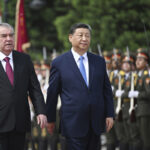Brazil’s government said on Thursday it could not interfere with a landmark EU law banning imports of commodities linked to deforestation, but will keep farming according to its own laws.
The law approved by the European Parliament on April 19 bans imports of coffee, beef, soy, palm oil, cocoa, rubber, wood, charcoal and derived products including leather, chocolate and furniture if they are linked to forest destruction.
Surging deforestation in Brazil’s Amazon has raised concerns in Europe in recent years and generated resistance to trade with the South American country in European legislatures.
Brazil’s agribusiness sector has said the country, which as a major soy, coffee and beef producer is one of the world’s largest food suppliers, already regulates deforestation under its forest code that allows some areas to be cleared.
“Brazil cannot interfere in a decision taken by the European Union on products linked to deforestation. We will continue to act in accordance with Brazilian legislation,” Agriculture Minister Carlos Favaro told reporters.
Former agriculture minister Roberto Rodriguez said the law amounted to a non-tariff trade barrier, calling it “exaggerated protectionism.”
He said the world needs to act to preserve the environment, but the EU was ignoring the laws of other nations and punishing producers which complied with their own laws.
“This will not preserve anything in Brazil, it is a purely commercial measure,” Rodrigues told Reuters. “If preservation of the environment is so important, set up a mechanism to finance it instead of punishing those who did nothing illegal.”
The law, which has still to be formally endorsed by the European Council, will requirecompanies that sell goods into the EU to produce a due diligence statement and “verifiable” information proving their goods were not grown on land deforested after 2020, or risk hefty fines.
The EU is the world’s third-largest palm oil importer and the world’s largest exporters, Indonesia and Malaysia, have accused it of blocking access for their products.
Source : Hellenic
















